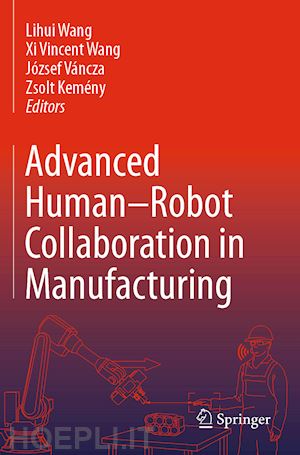
Questo prodotto usufruisce delle SPEDIZIONI GRATIS
selezionando l'opzione Corriere Veloce in fase di ordine.
Pagabile anche con Carta della cultura giovani e del merito, 18App Bonus Cultura e Carta del Docente
This book presents state-of-the-art research, challenges and solutions in the area of human–robot collaboration (HRC) in manufacturing. It enables readers to better understand the dynamic behaviour of manufacturing processes, and gives more insight into on-demand adaptive control techniques for industrial robots.
With increasing complexity and dynamism in today’s manufacturing practice, more precise, robust and practical approaches are needed to support real-time shop-floor operations. This book presents a collection of recent developments and innovations in this area, relying on a wide range of research efforts.
The book is divided into five parts. The first part presents a broad-based review of the key areas of HRC, establishing a common ground of understanding in key aspects. Subsequent chapters focus on selected areas of HRC subject to intense recent interest. The second part discusses human safety within HRC. The third, fourth and fifth parts provide in-depth viewsof relevant methodologies and algorithms. Discussing dynamic planning and monitoring, adaptive control and multi-modal decision making, the latter parts facilitate a better understanding of HRC in real situations.
The balance between scope and depth, and theory and applications, means this book appeals to a wide readership, including academic researchers, graduate students, practicing engineers, and those within a variety of roles in manufacturing sectors.
Professor Lihui Wang is a Chair Professor of Department of Production Engineering, KTH Royal Institute of Technology. He gained his Bachelor degree from Tsinghua University (China) in 1982, followed by his Master and PhD from Kobe University (Japan) in 1990 and 1993, respectively. He is the Editor-in-Chief of Journal of Manufacturing Systems, International Journal of Manufacturing Research, and Robotics and Computer-Integrated Manufacturing. He has published over 500 journal and conference papers, 31 book chapters and 10 books.
Dr. Xi (Vincent) Wang is an Associate Professor in the IIP Department of Production Engineering, KTH Sweden. He is working with the division of Sustainable Manufacturing Systems (SPS). Vincent received his PhD and Bachelor degrees in Mechanical Engineering from the University of Auckland (New Zealand) and Tianjin University (China), in 2013 and 2008, respectively. Vincent’s main research focus includes Cloud-based manufacturing, sustainable manufacturing, robotics, computer-aided design, and manufacturing systems. He also serves as the managing editor of the International Journal of Manufacturing Research (IJMR), Associate Editor of SME Journal of Manufacturing Systems (JMS), and Array—Open Access Journal by Elsevier.
Dr. József Váncza is Head of the Research Laboratory on Engineering and Management Intelligence in the Institute for Computer Science and Control (SZTAKI) of the Eötvös Loránd Research Network, Budapest, Hungary, as well as Associate Professor at the Budapest University of Technology and Economics (BME). He received his MSc (1984) and PhD (1994) degrees from BME and the Hungarian Academy of Sciences, respectively. He is Fellow of the International Academy for Production Engineering (CIRP) where he served as Chair of STC O. He is author of 200+ scientific publications, including 25 book chapters, and editor of 4 books.
Dr. Zsolt Keményis a senior researcher at the Laboratory on Engineering and Management Intelligence in the Institute for Computer Science and Control (SZTAKI) of the Eötvös Loránd Research Network, Budapest, Hungary. He received his computer science MSc and PhD from Budapest University of Technology and Economics, in 1998 and 2004, respectively. Aside from research focusing on robotics, automation and manufacturing, he is also teaching mechatronics, cyber-physical production systems, and robotics. He is author or co-author of 77 scientific publications.











Il sito utilizza cookie ed altri strumenti di tracciamento che raccolgono informazioni dal dispositivo dell’utente. Oltre ai cookie tecnici ed analitici aggregati, strettamente necessari per il funzionamento di questo sito web, previo consenso dell’utente possono essere installati cookie di profilazione e marketing e cookie dei social media. Cliccando su “Accetto tutti i cookie” saranno attivate tutte le categorie di cookie. Per accettare solo deterninate categorie di cookie, cliccare invece su “Impostazioni cookie”. Chiudendo il banner o continuando a navigare saranno installati solo cookie tecnici. Per maggiori dettagli, consultare la Cookie Policy.